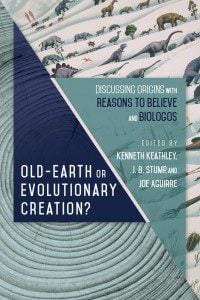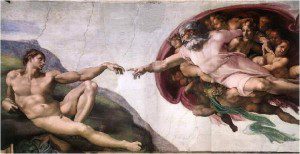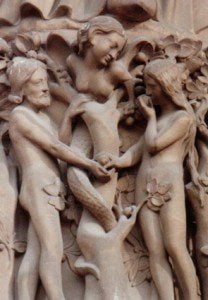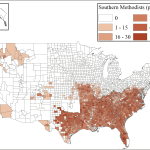 One of the most contentious questions in the conversation between contemporary science and faith is the question of Adam – more specifically human origins and the origin of sin. The next set of essays and responses in Old Earth or Evolutionary Creation homes in on this question. Loren Haarsma and Kenneth Samples provide perspectives from BioLogos and Reasons to Believe respectively. Ted Cabal acts as the Southern Baptist moderator for this discussion. The question posed doesn’t ask for a definitive answer, but rather for the range of viable positions concerning Adam and Eve.
One of the most contentious questions in the conversation between contemporary science and faith is the question of Adam – more specifically human origins and the origin of sin. The next set of essays and responses in Old Earth or Evolutionary Creation homes in on this question. Loren Haarsma and Kenneth Samples provide perspectives from BioLogos and Reasons to Believe respectively. Ted Cabal acts as the Southern Baptist moderator for this discussion. The question posed doesn’t ask for a definitive answer, but rather for the range of viable positions concerning Adam and Eve.
Loren Haarsma begins by laying a foundation with three key doctrines to which the people associated with BioLogos are committed (p. 50).
- Humans are created “in the image of God,” with a special relationship to God and a role to play in God’s creation.
- All humans who have ever lived have sinned by rebelling against God’s revealed will.
- God has dealt with sin through Christ’s incarnation, death, resurrection, ascension, and promised return.
Viable positions concerning Adam will affirm these three points – even if questioning some of the traditional theological positions that have surrounded them. There are a number of viable views of Adam that are consistent with these doctrines. They can’t all be right of course, but it is not wise to question the commitment of individuals to orthodox Christian belief on the basis of their preferences or current thinking here.
Loren sketches four general positions on the question of Adam and Eve that are faithful to Christian doctrines and to our understanding of biology, genetics, and evolution (pp. 53-55).
- Adam and Eve as a transformed pair of ancient representative-ancestors of all humanity. … God specially selected a pair not only to receive special revelation but also to be miraculously transformed … to make it possible for them to be truly holy, capable of obeying all of God’s spiritual and moral requirements. While they were for a while able not to sin, nevertheless they sinned, and the special grace that allowed them to be sinless was withdrawn. … The spiritual, psychological, and cultural effects of sin eventually spread to the entire population.
- Adam and Eve as a small group of ancient representative-ancestors of all humanity. … God specially selected a small family group of a few dozen individuals to receive special revelation. Although they could have lived according to God’s expectations for them, they chose to sin. These people are among the ancestors of all humans.
- Adam and Eve as a pair of recent representatives of all humanity. God specially selected a pair of individuals to receive revelation and to act as representatives (but not ancestors) of all human beings. They disobeyed God and fell into sin in a concentrated historical event. Because they sinned as representatives of all humanity, all of humanity fell into sin.
- Adam and Eve as literary figures in a highly compressed history of all our ancestors. … God used both general and special revelation to tell them how they ought to behave and the consequences of disobedience. They chose disobedience again and again.
There is much to unpack behind each of Loren’s brief descriptions and my summaries just hit the high points of his descriptions. There are many variations and implications to be explored in these and related positions.
 Kenneth Samples and Reasons to Believe are far more specific. RTB teaches, and its people affirm, a traditional view of Adam and Eve.
Kenneth Samples and Reasons to Believe are far more specific. RTB teaches, and its people affirm, a traditional view of Adam and Eve.
- God immediately and supernaturally created Adam directly, immediately, and in fully functional form from the dust of the ground, and Eve was created later from the body of Adam.
- God uniquely created Adam and Eve in the divine image.
- Adam and Eve were the first human beings created and progenitors of the entire human race.
- Adam and Eve’s act of disobedience brought sin into the world, and that original sin was passed on to their descendants.
Samples believes that this is the best foundation for the historic Christian view. He also holds that it is the only view really consistent with Scripture, at least in part because (he claims) both Jesus and Paul viewed Adam as historical and Paul’s theology requires a historical Adam. This is an area where the Bible must trump science – the scientific consensus on human origins must be discarded. Now Samples doesn’t put it quite like this. He emphasizes the flux in human knowledge and understanding. Current scientific conclusions may (and often are) still in a state of flux and confusion. “RTB does not think it is wise or prudent to set aside an essential biblical truth of Asam’s historicity and fatherhood of the human race based on current scientific consensus that is open to change and interpretation.” (p. 60)
Redirect. Ted Cabal posed a couple of great questions in redirect. I put my own paraphrase of these questions here. To Loren: Don’t these views (especially #4) imply that the first humans were created as sinners? To Kenneth: How does RTB reconcile their view that there is a correlation of biblical and scientific when both are rightly interpreted with the insistence on a traditional view of Adam?
Loren responded that “God did not create the first humans as sinners; however God did create the first humans with the ability to choose to sin.” (p. 61) I think this is a key point, and it is true no matter what view a Christian takes of human origins. The special creation of Adam and Eve, whether in the context of an old or young creation holds the same view. Sin requires disobedience to God’s commands and humans were created with the ability (even inevitability) of falling into sin.
He also points out that there are theological consequences to the traditional view, and these must be reckoned with. “Science by itself never dictates how we interpret Scripture. Science only alerts us to new theological problems we had not considered before.” (p. 62)
Kenneth Samples reiterated the RTB position on Adam and Eve and then addressed Ted’s question. Summarized and/or paraphrased the points on p. 66: (1) Scripture is the supreme authority because of its explicit propositional nature. (2) The historicity of Adam and his role as progenitor of the human race seems to be the clear teaching of Scripture. (3) To depart is to destructively reinterpret the nature of historic Christianity. (3) Science on human origins is fluid and open to interpretation. (4) It seems biblically prudent and necessary to continue to affirm the teaching of historic Christianity.
He warns that the flexibility on the question of Adam allowed by BioLogos “may lead to an uncomfortable uncertainty.” (p. 66)
 Some thoughts of my own. I don’t see the question of Adam as foundational in the way that Kenneth Samples and Ted Cabal (and perhaps even Loren Haarsma) do. Despite Samples assertion, Jesus never mentions or alludes to Adam and Eve except indirectly. Jesus refers to the institution of marriage between a man and a woman as ordained and instituted by God; he jumps from Genesis 1:27 (male and female) to 2:24 ‘For this reason a man will leave his father and mother and be united to his wife, and the two will become one flesh.’
Some thoughts of my own. I don’t see the question of Adam as foundational in the way that Kenneth Samples and Ted Cabal (and perhaps even Loren Haarsma) do. Despite Samples assertion, Jesus never mentions or alludes to Adam and Eve except indirectly. Jesus refers to the institution of marriage between a man and a woman as ordained and instituted by God; he jumps from Genesis 1:27 (male and female) to 2:24 ‘For this reason a man will leave his father and mother and be united to his wife, and the two will become one flesh.’
More than this – the foundation of Christian faith is a belief in God the creator of all and in Jesus Christ and his life, death, resurrection. Adam has been used and emphasized in the church as a way to flesh out exactly what this means. We should be open to the fact that our interpretations – this fleshing out – could be wrong. Paul uses Adam to flesh out his understanding of Christ – but even here our interpretation of Paul’s intent could be wrong. This is the essence of Scot’s argument in Adam and the Genome. Paul may not have intended what became the Augustinian view of original sin in his teaching.
I also think that we should move from thinking of Scripture as “propositional” and toward reading it as the story of God’s mission in the world. There are some important propositions to be sure, but in general the overarching story carries the message. Scripture is a supreme authority – not because it is propositional, but because it reveals God’s relationship with his people through a variety of means and literary genre.
It is dangerous to make non-essentials foundational. The flexibility allowed by BioLogos on the question of Adam does lead to uncomfortable uncertainty – but this is a current necessity. The RTB position runs the risk of conveying the impression that studies of human origins provide a scientific means of disproving Christian faith. If, down the road, all of the science that is “fluid and open to interpretation” becomes less fluid and quite demonstrably sound, insistence on a traditional view of Adam becomes a barrier to faith. Speaking only for myself, if the choice is (1) ‘traditional’ view as outlined by Samples and agreed to by Cabal or (2) Christianity is a fraud … well then I must conclude that science has disproved Christianity. The “traditional” view is not defensible in light of what we do know today, imperfect and fluid though it may be. However, I am convinced that the choice is not between (1) and (2) … we must continue to talk, read, study, pray, and think.
I would rather err on the side of “uncertainty” than proclaim with certainty an unnecessarily restrictive position.
What is your thinking on this question?
How important are Adam and Eve to Christian faith?
If you wish to contact me directly, you may do so at rjs4mail[at]att.net
If interested you can subscribe to a full text feed of my posts at Musings on Science and Theology.















